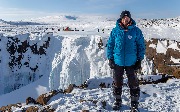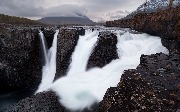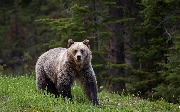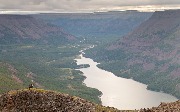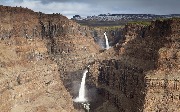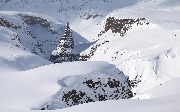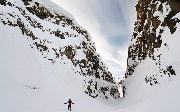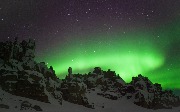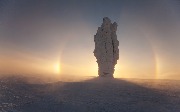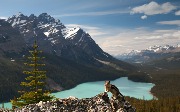The challenge to himself: MAI professor is a pioneer tourist in hard-to-reach corners of our country
Andrey Podkorytov, lecturer at the Institute No. 4 "Radioelectronics, Infocommunications and Information Security", associate professor, Candidate of Technical Sciences, author of two textbooks and several dozen scientific publications. And at the same time, a candidate for master of sports in sports tourism. He became the first person to cross the Putorana Plateau alone on skis in 2020 and the Anabar Plateau in 2022.
Walking hundreds of kilometers of the route in the most difficult conditions and reaching places where a human foot may not have set foot before – that is what he calls "a touch of eternity." He first tried himself at solo hiking eleven years ago during scientific internship in Canada, where he went as a graduate student of MAI. Andrey Podkorytov uses examples from personal experience from routes to different parts of the country in his lectures on satellite navigation and communications at Moscow Aviation Institute. During his travels, he gets unique pictures of pristine nature, which become winners and finalists of prestigious photo contests. We talked with him and learned how sports tourism is connected with teaching, science and creativity.
One step from research to hiking
Quickly close the session and go home to the Southern Urals, – Andrey Podkorytov's summer began with such plans when he was still a student at MAI. On vacation, he went on mountain hikes with a company of Ural tourists.
– I knew that MAI has a very strong tourist club and alpclub, but unfortunately we became friends with them later. In 2021, in a team led by the chairman of the route commission of the tour club and MAI graduate Sergey Romanenkov, they managed to go on a very difficult and interesting hike - almost 600 kilometers along the Putorana plateau, the hike won the Russian championship," says Andrey.
At the same time, Andrey Podkorytov's hobby is difficult solo hikes, they appeared in his life by coincidence.
– In 2012-2013, I spent nine months in Canada: as a graduate student of the MAI, I received a presidential grant to study abroad and was engaged in scientific work on high-precision positioning in navigation systems such as GLONASS and GPS. The navigation accuracy in the phone is several meters. This will suit you if you are a mushroom picker. But there are many professional applications where centimeter accuracy is important. I work with such location algorithms, - the researcher explains.
Once in the reach of incredibly beautiful national parks on the west coast of Canada, it was impossible to miss the chance to go there. So, there were three solo two-week hikes in winter, summer and autumn.
– There are no fears of single autonomy. I'm comfortable in a solo format, it's like meditation. In urban life, disturbing problems and questions are accumulating. In a clean place, in pristine nature, where there is no one, it is enough to think about it and a decision comes. However, after a month of being alone in nature, it can be difficult to come back to people. I alternate single routes and group ones.
Everything is interconnected: the conducted research and accumulated knowledge in the field of navigation and satellites help on routes.
– In this sense, I am a child of progress, – he smiles. – Previously, people were guided by the stars, now everything is easier: in addition to the map and compass, there is a satellite phone and a navigator. Understanding how it all works helps on routes. Besides, in addition to MAI, I work at a rocket and space industry enterprise, there are business trips to remote places. I try to include examples from real practice in lectures. I brought students from Chukotka photos of the Orbita satellite communication system station, we discussed how it worked. There was also an illustrative case in Chukotka: due to an error, the navigation software stopped working when crossing the 180th meridian, which led to the disruption of many tasks of the expedition. It's all interesting, real practice, they won't write about it in textbooks.
Unexpectedly for students, artifacts from the Bering Sea coast may also appear in the classroom.
– Last summer I just arrived from Chukotka, on the same day there was the first class of summer practice. I had with me the intervertebral disc of a gray whale, the jaw of a walrus, the vertebra of a beluga whale – a week ago they were lying on the coast of the Bering Sea, I took them out and showed them to the guys. At any lecture, there are some pauses: you can yawn and stretch, or you can tell something about the ethnography of Taimyr, about the Putorana plateau, about how Alaska is visible from Cape Dezhnev and how sea whales get whales in Chukotka. Such a switch for a few minutes is a rest and broadening of horizons for students.
About how in life it turns out to combine the roles of a teacher, a scientist, an athlete and a tourist, Andrey Podkorytov says the following:
– It turns out I would not combine everything. There is no enough time for a lot of things. It's probably about prioritization. I was offered a high-paid job in my specialty with a multiple increase in salary. I refused: all activities would no longer fit into the schedule. My lifestyle does not bring a lot of money, but it gives a lot of things that cannot be measured with money.
"Notches" of travel
"Anchor" or "notch" is how Andrey Podkorytov calls the emotional imprint that remains from each hike. Observations of wild animals and unique natural phenomena are etched into the memory.
– During solo hikes in Canada, a moose came to me, and a cougar touched the edge of the tent with his whiskers. I met bears many times in a variety of areas: in the Urals, in the Sayans, in Kamchatka, on the Putorana plateau, in Canada, in Chukotka. Vivid impressions were left from meetings with the Putoran snow sheep – the rarest animal endemic to the Putoran plateau. I was lucky enough to spend several hours taking pictures, this is a great success.
Another "notch" is the northern lights
– In the 2021 campaign on the Putorana plateau, our camp stood on the edge of the canyon of the Kanda River with a 108-meter-high waterfall. We got there on time, it was very cold and everything came together: we watched the multicolored northern lights against the background of the highest waterfall in Russia with a direct fall of water. In 2020, on the first night of a solo ski trip across the Putorana plateau, I spent the night on the Ayakli River, there was no one around for 150 km, and the northern lights shimmered overhead. It was just euphoria, at that moment I realized that everything would work out.
The Putorana plateau has become one big "notch" – Andrey Podkorytov has been there nine times (seven of them singly) and walked, packrafted and skied about 3,500 km.
And on the Manpupuner plateau in the Komi Republic, 30-meter-high ancient stone remains were etched into memory.
– The Voguls considered this place sacred and did not go up there. The remains have been there for millions of years – in the rain, in a blizzard, in frosts. You touch them with your hand and realize how small you are on the scale of nature. It's exciting. For me, it's like touching eternity.
"They beat us – we grow stronger"
Behind all the campaigns are years of experience, and sometimes injuries. It's not always as simple as it seems, difficult situations happen on the routes.
– In 2020, on the Putorana plateau, I fell from a snowmobile on the ice during the race and tore my ligaments, the whole hike was with an injury, recovery lasted almost a year. In the Northern Urals, I froze my hands and feet. It happened that in winter I was left without a burner and food, the tent broke down. There were 40 hours without sleep. But all these difficulties did not discourage the desire to go on such hikes and be friends with nature.
Andrey Podkorytov considers the first single ski crossing of the Putorana plateau in 2020 to be one of the hardest routes, the preparation for which took a year and a half.
– Usually they hike in groups along the river valleys, and I wanted to cross the central elevated part. This was the first hike of this kind, it turned out to be quite difficult.
In 2022, the route turned out to be even harder – crossing the Anabar plateau with a half-year preparation. It was the second ski route completed in that area in history and the first – alone. The 600 km route took 33 days, the athlete lost about 15 kg of his weight and recovered for seven months.
Save the moment
Taking unique pictures in hard-to-reach places is another hobby of Andrey Podkorytov. It all started with a small camera to photograph something interesting on the first hike. Over time, high-quality photographic equipment and numerous lenses replaced it. Along with the interest, the quality of photographs has also grown, which are now prize-winners and finalists of prestigious photo contests of natural photography.
– I go on quite ascetic hikes: there is not enough food, because of the weight of the camera, lenses, quadcopter and other equipment. With a strict regime and austerity, I pay for the opportunity to take pictures in unique places and then share it with people, because few people have the opportunity to go where I happened to be.
For example, a picture with a Putorana snow sheep on the background of Duluk Lake became the winner of the international photo contest "Golden Turtle". It took several hours of the white northern night to wait for the moment to make it.
– I saw a Putorana ram on the slope in the evening, quitted everything, got closer to him and hid. I had to sit in the shelter until morning, watching until he wakes up. In the morning, the ram got up and started stretching, I took the long-awaited picture. It was worth it, the picture is rare. Two years earlier, I was also lucky to shoot Putoran snow sheep against the background of Lake Kutaramakan. And the video from the Putorana plateau won the video nomination of the RGO contest "The most beautiful country".
The main thing here is to be in the right place at the right time, even if you have to walk hundreds of kilometers to do it.
– Long distances and difficult weather conditions are not an end in itself. This is a fee to get to hard-to-reach places. The more beautiful and safer a place is, the further away it is. In no case can you fight with nature - nature is always stronger. You can fight with yourself and the circumstances. If this is a challenge, it is by no means to nature, but only to yourself.
